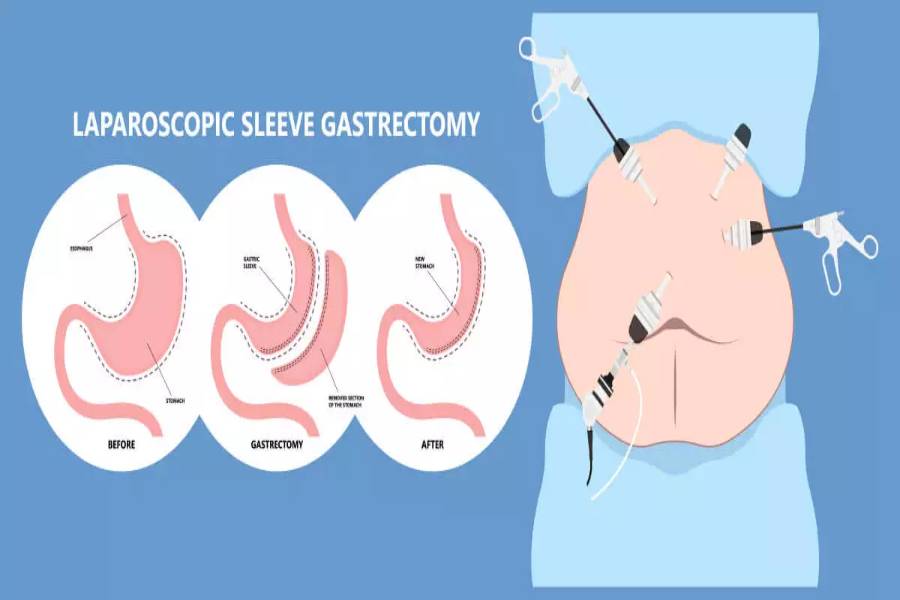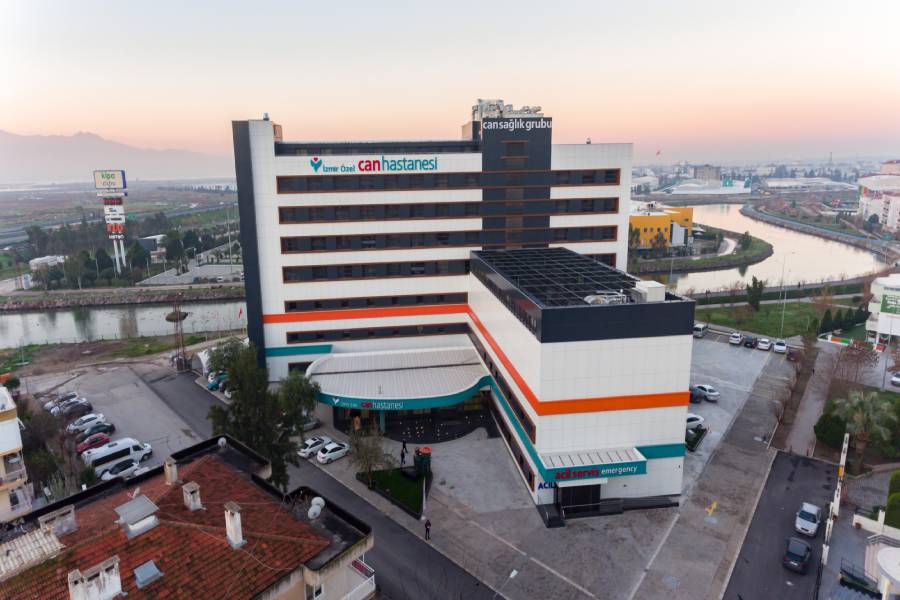Who is suitable for gastric sleeve surgery?
Categorised in: HEALTH GUIDE, Genel
Published Date:
Gastric sleeve surgery, also known as sleeve gastrectomy, is a type of bariatric surgery aimed at significant weight loss for individuals with obesity. This procedure involves the removal of a substantial portion of the stomach, leaving a small, sleeve-shaped pouch. This design limits food intake, promoting weight reduction. However, the question remains: who is an ideal candidate for this surgery?
Several factors must be evaluated to determine suitability for gastric sleeve surgery. These include your body mass index (BMI) and any obesity-related health conditions. Additionally, a commitment to long-term lifestyle changes is crucial. Consulting with an experienced bariatric surgeon at a reputable facility, such as Can Hospital in Izmir, is essential. This consultation will help assess your individual suitability for this effective obesity surgery.

What is Gastric Sleeve Surgery?
Gastric sleeve surgery, or sleeve gastrectomy, is a prominent weight loss surgery. It significantly reduces weight by removing about 80% of the stomach. This leaves a narrow, sleeve-like stomach, limiting food intake and inducing quicker satiety.
This procedure not only restricts food but also diminishes ghrelin production, a hunger-inducing hormone. Consequently, patients experience reduced hunger and cravings. This makes adhering to a balanced diet and lifestyle more manageable. The surgery is performed laparoscopically, offering smaller incisions, less scarring, and a quicker recovery compared to open surgery.
Can Hospital in Izmir, Turkey, is a leading institution for weight loss surgeries, including gastric sleeve. It is home to a team of seasoned bariatric surgeons who have successfully aided numerous patients in their weight loss journeys. The hospital’s commitment to advanced facilities and personalized care creates a nurturing environment for those seeking to undergo gastric sleeve surgery.
Despite its numerous advantages, gastric sleeve surgery carries inherent risks. Complications such as bleeding, infection, or adverse reactions to anesthesia are possible. However, Can Hospital’s medical team meticulously prepares to mitigate these risks, striving for optimal patient outcomes.
Body Mass Index (BMI) Requirements
The Body Mass Index (BMI) is pivotal in assessing eligibility for gastric sleeve surgery. Calculated by dividing weight in kilograms by height in meters squared, it serves as a foundational metric. Typically, a BMI of 40 or higher is required for this obesity surgery.
However, individuals with a BMI between 35 and 39.9 may also qualify if they suffer from obesity-related health conditions. These include type 2 diabetes, sleep apnea, and high blood pressure. Such comorbidities can drastically affect one’s quality of life and elevate the risk of severe health issues.
While BMI is a critical factor, it is not the only criterion for gastric sleeve surgery eligibility. Healthcare professionals also consider overall health status, medical history, and the patient’s commitment to lifestyle changes. These factors collectively determine a patient’s suitability for the procedure.
If you suspect you might qualify for gastric sleeve surgery based on your BMI and other criteria, consulting a bariatric surgeon is advisable. They can conduct a comprehensive evaluation and assist in determining your eligibility for this life-changing surgery.
Health Conditions that Qualify for Gastric Sleeve
The primary determinant for gastric sleeve surgery eligibility is a high body mass index (BMI). However, specific obesity-related health conditions can also qualify individuals for this procedure. These comorbidities often stem from excess weight, significantly impacting a person’s quality of life.
Type 2 diabetes is a prevalent comorbidity among gastric sleeve candidates. It occurs when the body becomes resistant to insulin or fails to produce sufficient amounts, resulting in elevated blood sugar levels. Gastric sleeve surgery has been shown to effectively improve or even resolve type 2 diabetes in many patients.
Sleep apnea is another obesity-related health condition that may qualify an individual for gastric sleeve surgery. This disorder causes repeated pauses in breathing during sleep, leading to daytime fatigue and an increased risk of heart disease. Gastric sleeve surgery can alleviate sleep apnea symptoms, improving overall sleep quality.
Hypertension, or high blood pressure, is common among those struggling with obesity. It puts extra strain on the heart and blood vessels, increasing the risk of heart disease and stroke. Gastric sleeve surgery has been shown to effectively lower blood pressure in many patients, reducing cardiovascular complications.
Lastly, joint pain and osteoarthritis are common comorbidities among gastric sleeve candidates. Excess weight adds stress to weight-bearing joints like the knees and hips, leading to pain and inflammation. Gastric sleeve surgery facilitates weight loss, alleviating joint pain and improving mobility in many patients.
Commitment to Long-Term Lifestyle Changes
Gastric sleeve surgery is a transformative tool for weight loss, yet it is not a panacea. To guarantee enduring success post-surgery, patients must dedicate themselves to enduring lifestyle transformations. This entails embracing a balanced diet, engaging in consistent physical activity, and securing continuous support from healthcare experts.
Post-surgery, patients must adapt their dietary habits to their reduced stomach capacity. This necessitates consuming smaller, more frequent meals and prioritizing nutrient-rich foods. The medical staff at Can Hospital in Izmir will offer indispensable guidance on nutrition, assisting patients in crafting a tailored meal plan to bolster their weight loss endeavors.
Furthermore, regular physical exercise is paramount for sustaining weight loss and enhancing overall health post-gastric sleeve surgery. Patients should strive to integrate both aerobic and strength training exercises into their regimen. The healthcare team at Can Hospital in Izmir will collaborate with patients to devise an exercise regimen that aligns with their unique capabilities and requirements.
Continuous support from the bariatric surgery team at Can Hospital in Izmir is vital for long-term success. Patients will benefit from regular follow-up appointments, nutritional counseling, and access to support groups. By maintaining a close relationship with their healthcare providers and steadfastly adhering to their new, healthier lifestyle, patients can achieve sustained weight loss and an enhanced quality of life following gastric sleeve surgery.
Sources;
https://pmc.ncbi.nlm.nih.gov/articles/PMC3788014
https://my.clevelandclinic.org/health/treatments/22931-gastric-sleeve-surgery

Why British Citizens Choose Turkey for Health Services?
British citizens are increasingly opting for Turkey when seeking medical treatments due to a combination of superior healthcare services, affordability, […]

Psychological Effects of Genital Aesthetics on Body Image
In a society increasingly focused on physical perfection, the realm of genital aesthetics has surfaced as an area of both […]

Common Concerns About Genital Plastic Surgery
Genital plastic surgery, a burgeoning field within the realm of cosmetic enhancements, has witnessed a notable surge in popularity. Procedures […]

In which cases is labiaplasty necessary?
Labiaplasty, a procedure that has recently garnered significant attention, involves the surgical reduction of the labia minora. This operation, also […]

Healthy Recovery Process After Genital Aesthetic Surgery
Day Things To Do Things to Avoid 1-7 Days – Bed rest – Using medications recommended by the doctor – […]